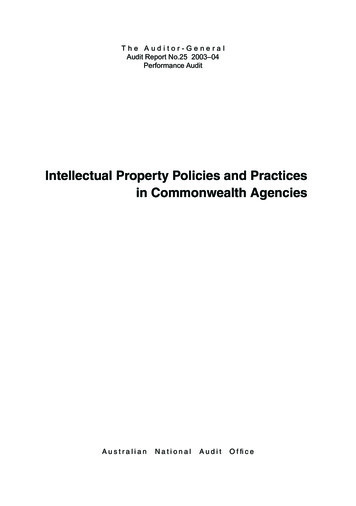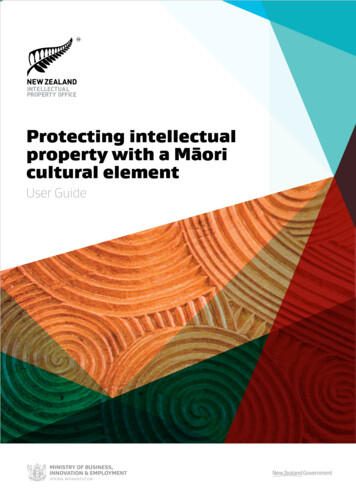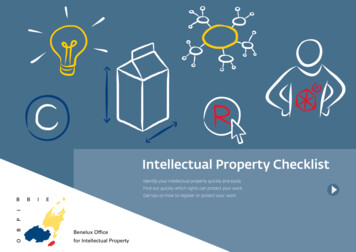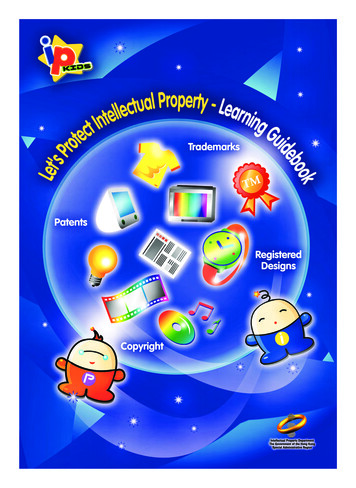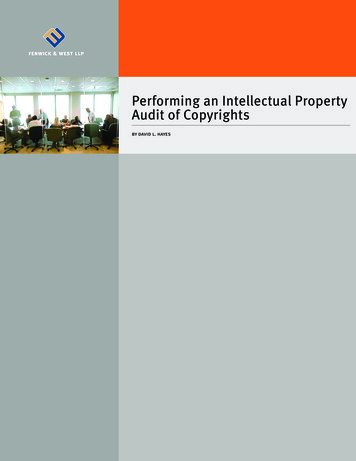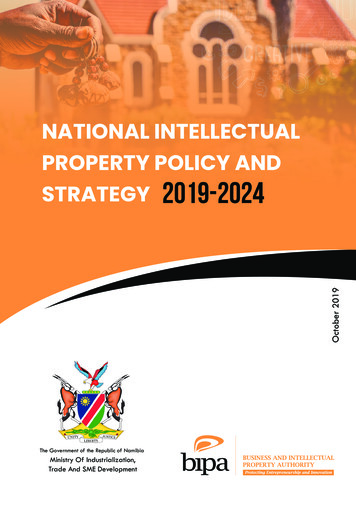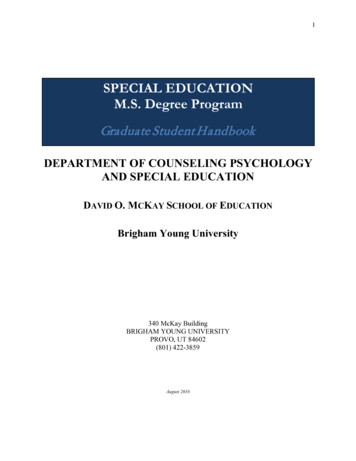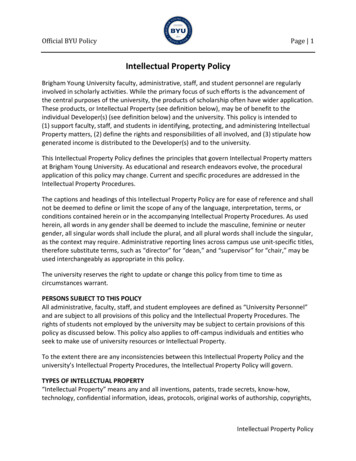
Transcription
Official BYU PolicyPage 1Intellectual Property PolicyBrigham Young University faculty, administrative, staff, and student personnel are regularlyinvolved in scholarly activities. While the primary focus of such efforts is the advancement ofthe central purposes of the university, the products of scholarship often have wider application.These products, or Intellectual Property (see definition below), may be of benefit to theindividual Developer(s) (see definition below) and the university. This policy is intended to(1) support faculty, staff, and students in identifying, protecting, and administering IntellectualProperty matters, (2) define the rights and responsibilities of all involved, and (3) stipulate howgenerated income is distributed to the Developer(s) and to the university.This Intellectual Property Policy defines the principles that govern Intellectual Property mattersat Brigham Young University. As educational and research endeavors evolve, the proceduralapplication of this policy may change. Current and specific procedures are addressed in theIntellectual Property Procedures.The captions and headings of this Intellectual Property Policy are for ease of reference and shallnot be deemed to define or limit the scope of any of the language, interpretation, terms, orconditions contained herein or in the accompanying Intellectual Property Procedures. As usedherein, all words in any gender shall be deemed to include the masculine, feminine or neutergender, all singular words shall include the plural, and all plural words shall include the singular,as the context may require. Administrative reporting lines across campus use unit-specific titles,therefore substitute terms, such as “director” for “dean,” and “supervisor” for “chair,” may beused interchangeably as appropriate in this policy.The university reserves the right to update or change this policy from time to time ascircumstances warrant.PERSONS SUBJECT TO THIS POLICYAll administrative, faculty, staff, and student employees are defined as “University Personnel”and are subject to all provisions of this policy and the Intellectual Property Procedures. Therights of students not employed by the university may be subject to certain provisions of thispolicy as discussed below. This policy also applies to off-campus individuals and entities whoseek to make use of university resources or Intellectual Property.To the extent there are any inconsistencies between this Intellectual Property Policy and theuniversity’s Intellectual Property Procedures, the Intellectual Property Policy will govern.TYPES OF INTELLECTUAL PROPERTY“Intellectual Property” means any and all inventions, patents, trade secrets, know-how,technology, confidential information, ideas, protocols, original works of authorship, copyrights,Intellectual Property Policy
Official BYU PolicyPage 2designs, trademarks, and service marks, and any and all rights, applications, and registrationsrelating to them.For purposes of this policy, Intellectual Property is divided into two categories, “TechnicalWorks” and “Creative Works.” Technical Works include Intellectual Property that is generally ofa scientific, engineering, or technical nature. Creative Works include all Intellectual Property notcovered in Technical Works and generally include works that are of an artistic, literary,dramatic, musical, scholarly, instructional, assessment, or entertainment nature.OWNERSHIPPursuant to law and university policy, any work (whether a Technical Work or a Creative Work)prepared by University Personnel within the scope of their employment, without an expressagreement specifying otherwise, is work for hire owned by the university. The Technical andCreative Works anticipated in this paragraph and owned by the university broadly include allIntellectual Property, or parts thereof, (a) conceived, developed, reduced to practice, or createdby University Personnel within the scope of employment at the university; on the university’stime; or with the aid, assistance, or substantial use of any of the university’s property,equipment, facilities, supplies, resources, or Intellectual Property; (b) resulting from any work,services, or duties performed by University Personnel for the university; or (c) related to thecurrent or demonstrably anticipated business, research, or development of the university. Inaccordance herewith, the university claims ownership of all Intellectual Property and relatedrights created by University Personnel pursuant to this paragraph, and University Personnelagree to assign and do hereby assign all right, title, and interest in any Intellectual Property,including future Intellectual Property, as described herein.The university retains ownership rights to all Technical Works, but will relinquish ownershiprights to the Developer(s) of academic Creative Works when “nominal” use of universityresources is involved in the production of the Intellectual Property. The use of universityresources is considered nominal when it is not substantial. See Intellectual Property Procedures.The university claims ownership in the resulting Intellectual Property in all universitycommissioned works in the absence of express written provisions stating otherwise, includingbut not limited to (a) works commissioned by the university to an individual who is not anemployee of the university and (b) works commissioned by the university to an individual whois an employee where the work to be created falls outside of that person’s scope ofemployment.Any dispute regarding ownership will be subject to the Dispute Resolution section below andthe corresponding provisions of the Intellectual Property Procedures.Intellectual Property Policy
Official BYU PolicyPage 3OWNERSHIP OF INTELLECTUAL PROPERTY OF NON-EMPLOYEE STUDENTSStudents (a “student” is a person enrolled in BYU courses for credit) who independentlydevelop Intellectual Property arising out of their participation in programs of study at theuniversity will retain the ownership rights (subject to the license described in the nextparagraph) to such property when the Intellectual Property does not result from theiremployment at BYU or where there is no written agreement to the contrary.Consistent with the common law doctrine of “shop rights,” when any person not employed bythe university either (a) engages in research or development of Intellectual Property under thesupervision and direction of a faculty member in connection with a program or activity subjectto this policy or (b) uses substantial university resources in connection with a research programor activity, the university retains the right to claim, as a condition of the student being allowedto participate in the project or use university resources, a non-exclusive, perpetual, royalty-free,paid-up, irrevocable license to exploit, use, and sublicense the resulting Intellectual Property.MISCELLANEOUS OWNERSHIP ISSUESUniversity Personnel may either act as a paid consultant to or participate in sponsored researchfor the same company but may not perform both at the same time. Exceptions may be grantedin rare situations when an appropriate management plan is approved by the department chairand college dean and written approval is obtained from the associate academic vicepresident—research and graduate studies.Consulting activities must be carried out consistent with the university’s Conflict of Interest andConflict of Time Commitment Policy and this policy. Activities must be administered assponsored research projects when there is a substantial use of university resources or whenBYU students are employed by the university in connection with such activities. The universitydoes not assert ownership to works produced as a result of consulting except in cases whereuse of university resources, including university-owned Intellectual Property, occurs to supportthe consulting activity.In all consulting arrangements, University Personnel act as independent consultants and are notauthorized to engage or obligate the university as a party to any contract. The university isneither liable nor responsible for any consulting arrangements, including any relatedperformance issues, utilization of third party property, observations, or consequent damages.The name of the university shall not be used in the consulting services, in any advertising, or inany other way.In a consulting agreement, University Personnel should not obligate the use of, divulge, ortransfer any Intellectual Property in which the university may claim an ownership interest. Thescope of such consulting endeavors must be communicated to the appropriate departmentchair and college dean to obtain written approval prior to commencing any contractual effort.Intellectual Property Policy
Official BYU PolicyPage 4University Personnel who receive title from the university to Intellectual Property pursuant tothis policy, as a condition of employment, shall grant back and hereby do grant back to theuniversity a perpetual, royalty-free, paid-up, irrevocable non-exclusive license to use theIntellectual Property for internal, noncommercial purposes, and the university may at its solediscretion sublicense such Intellectual Property to The Church of Jesus Christ of Latter-daySaints on similar terms.DEVELOPERS“Developers” are individuals or groups of individuals who make a significant original, creativecontribution to the conception or reduction to practice of Intellectual Property. Others who aredirected in the performance of their work or merely following the instruction of others are notDevelopers. Accordingly, Developers typically will not include administrative and staffemployees, research associates, post docs, research technicians, and students.Notwithstanding anything herein to the contrary, administrative and staff personnel, who in thescope of their employment develop Intellectual Property, usually will not receive a share ofrevenues resulting from the commercialization of such Intellectual Property. Support areas(non-academic units), however, may elect to handle internally the commercialization andrevenue sharing of Intellectual Property developed by administrative and staff personnel in thescope of their employment, provided that the support areas must receive approvals from(1) the associate academic vice president—research and graduate studies and (2) the line vicepresident.MANAGEMENT OF INTELLECTUAL PROPERTYThe Technology Transfer Office and the Creative Works Office have the primary responsibility ofassisting University Personnel in managing Intellectual Property within the university, includingthe development, protection, acquisition, and commercialization of Intellectual Property. TheBYU Office of Licensing and Trademark Administration oversees the management of universitytrademarks, service marks, logos, names, seals, and indicia (see University TrademarkProtection and Licensing Services Policy). University entities should not separately manageuniversity-owned Intellectual Property or establish organizations or companies to do so withoutexpress written approval from their appropriate line vice president. University Personnel maynot use university resources, facilities, or work time to engage in commercial activities,businesses, or “start-up” companies.ADMINISTRATIVE PROCESSESIt is the responsibility of deans and chairs to ensure that university resources—including facultytime—are used appropriately.The following general disclosure policies have been established to facilitate cooperationbetween University Personnel and the Technology Transfer Office and Creative Works Office.Intellectual Property Policy
Official BYU PolicyPage 5DisclosureFull and proper academic disclosure consists of four parts:1.Within 120 days following commencement of employment at BYU, UniversityPersonnel should disclose in writing, in sufficient detail to identify clearly, allIntellectual Property invented, authored, made, or conceived by the individual,alone or with others, prior to the employment or association with the university. TheIntellectual Property Policy will not apply to any Intellectual Property so disclosed.2.Prior to any public use or disclosure of Intellectual Property, all related TechnicalWorks and those Creative Works involving substantial use of university resources,and for which there is an intent or potential for commercialization, should bedisclosed to the Technology Transfer Office or the Creative Works Office,respectively. Upon disclosure, the Technology Transfer Office or the Creative WorksOffice will make an initial determination in a timely manner to either pursueIntellectual Property protection and/or commercialization or release the rights tothe Developer(s).3.An important aspect of disclosure is the determination of who constitutes adeveloper and what their respective contribution have been to the intellectualproperty being disclosed. This should be agreed upon prior to any attempts atcommercialization.4.All Developers of works that may fall under university ownership shall fully discloseto the university any financial and/or other relationships, including federal funding,that might affect or encumber the transfer of Intellectual Property to any offcampus individual or entity.Intellectual Property disclosed to the Technology Transfer Office or Creative Works Office willbe governed by the Intellectual Property Policy and Intellectual Property Procedures that are ineffect at the time of the earliest disclosure.Approval of Transfer AgreementsAny proposed transfer of Intellectual Property from the university will be reviewed by the chair,dean, director of the Technology Transfer Office or Creative Works Office, Office of the GeneralCounsel, and associate academic vice president—research and graduate studies. The finaldecision concerning transfer will be made by the associate academic vice president—researchand graduate studies.INCOME DISTRIBUTIONWhen revenues derived from university-owned Intellectual Property are received andadministered by the Technology Transfer Office or Creative Works Office, the net incomeIntellectual Property Policy
Official BYU PolicyPage 6available for distribution will consist of total revenue received from a given Intellectual Propertyminus direct costs incurred in the process of developing, marketing, perfecting, transferring,and protecting university rights to the Intellectual Property, together with interest costs. Anaccurate accounting of all such costs and deductions shall be made available to theDeveloper(s).Unless otherwise agreed upon in writing by the parties, and approved as discussed below, thenet income (gross income minus university expenses) from university-owned IntellectualProperty will be distributed as follows:Developer(s) (other than principal stock holders of the commercialization of atechnology) – 45%College(s) of the Developer(s) – 27.5%Technology Transfer or Creative Works Office – 27.5%Examples of university expenses to be reimbursed from gross income include legal costs,patentability studies, filing of patents, litigation in connection with a patent, university orchurch derived funding (e.g., development funding through a university support unit such asthe Center for Teaching and Learning). IPS staff salaries or wages are not included in thesereimbursable costs.Exceptions to Standard Income DistributionAny exceptions to the standard income distribution described above must have appropriateprior written approval by the college dean or equivalent supervisor, the associate academic vicepresident—research and graduate studies or line vice president, and the Technology TransferOffice, Creative Works Office, or Copyright Licensing Office, as applicable. Any incomedistribution due to a Developer will be paid to the Developer’s estate in the event theDeveloper is deceased.Occasionally a Developer may become a principal equity owner of a company that licensesuniversity Intellectual Property. In such cases, the developer will forfeit his or her distributionoutlined above. For purposes of this policy and the Intellectual Property Procedures, a principalequity owner is one who controls ten percent or more equity in the company.On rare occasions, there may be compelling reasons to allow University Personnel toparticipate as a voting member of a company board; provided that (i) the company has notraised more than 3,000,000 and (ii) non-accredited investors are not involved. Consistent withthe university’s conflict of interest policies, any such participation requires full disclosure to andprior written approval from the dean, the associate academic vice president—research andgraduate studies, and the Technology Transfer Office, Creative Works Office, or CopyrightLicensing Office, as applicable.Intellectual Property Policy
Official BYU PolicyPage 7Prior to distribution, Developer(s) may elect to designate all or a portion of their allocatedincome to fund their scholarly activities but may not pay themselves salary or consulting feesfrom such funds. If this election is made, the Developer’s contributions will be matched asprovided in the Intellectual Property Procedures.In the event that a Developer(s) elects to designate all or a portion of their allocated income (asspecified in an Income Distribution Agreement) to fund their scholarly activities (includingequipment and supplies purchases; student, post-doctoral, and assistant wages or support; andresearch-related travel, the Developer’s contributions will be matched. The college(s) and theIntellectual Property Services office, respectively, will contribute matching funds to theDeveloper’s research account or the university, in the ratio of 27.5 to 17.5 (or 61:39) up to amaximum combined match of forty-five percent. (Thus, ten percent will be reserved forTechnology Transfer or Creative Works office support.)Administrative Review and DiscretionWhen the university receives more than 1,000,000 in total income from any single IntellectualProperty in any calendar year, an administrative review of this source of income will be initiatedby the academic vice president and the administrative vice president. The administrative reviewmay result in an alternative distribution of the university’s portion of the income, but thedistribution to the Developer(s) will not be affected.University Ownership of EquityIf the university receives equity in a company as a condition for a license or an assignment ofIntellectual Property, then BYU will be the holder of such equity and any income BYU receivesfrom such equity will be distributed pursuant to the income distribution described above. Suchequity will not be distributed to the Developer(s).Multiple DevelopersIf there are multiple Developers, the “principal Developer” is the individual who exertedgreatest control over the development of Intellectual Property (e.g., by obtaining funding,hiring employees, and directing the research). The principal Developer will devise anappropriate and equitable formula, based on respective contributions, to share the Developer’sportion of the distributed income among the multiple Developers. The Technology TransferOffice, Creative Works Office, or Copyright Licensing Office will prepare and circulate an“Income Distribution Agreement” to the Developers, the chair, and the dean (or equivalentsupervisor(s)) for approval before distribution of income. When appropriate, such agreementsmay need to be periodically reviewed by the chair for current applicability (e.g., when majorchanges in personnel or efforts occur or because of subsequent research contributions). Thechair, or equivalent supervisor, will submit recommendations for any changes in distribution tothe Technology Transfer Office, Creative Works Office, Copyright Licensing Office, or the linevice president, as applicable.Intellectual Property Policy
Official BYU PolicyPage 8Department as DeveloperIf a university unit, such as an academic department, fully sponsors the development ofIntellectual Property, the unit shall be considered the Developer and will receive theDeveloper’s portion of the distributed income.Additional Compensation to University PersonnelIncome distributed to the college or to faculty research accounts must be used in accordancewith university policies and cannot be used to pay bonuses or other types of compensation toUniversity Personnel over and above that approved by the job classification. Likewise, theDeveloper’s share taken as personal income may not be used to compensate UniversityPersonnel for work performed within the scope of their employment.Tax LiabilityEach Developer should consult a tax advisor to understand his or her individual taxconsequences and reporting obligations related to any distribution under the IntellectualProperty Policy.Distribution ScheduleIncome distributions will be made according to the schedule provided in the IntellectualProperty Procedures.DISPUTE RESOLUTIONAny dispute with respect to this policy involving the Developer(s), departments, colleges, theTechnology Transfer Office, or the Creative Works Office that cannot be settled throughinformal discussions or mediation (if agreed to by the parties), including but not limited to anydispute regarding income distribution, shall be submitted to the associate academic vicepresident—research and graduate studies for resolution. Dispute resolution shall proceed inaccordance with this policy and the Intellectual Property Procedures. The claim of aDeveloper(s) relating to Intellectual Property will be deemed waived unless the Developer(s)submit such claim to the associate academic vice president—research and graduate studies nolater than five years from the date of the event that gave rise to the claim.[Approved 17 Jun 2019; Prior Version 16 Oct 2000]IMPLEMENTING al%20Property%20Procedures 2019-0617%20FINAL 0.pdfAPPLICABILITY: This policy applies to all administrative, faculty, staff, and student employees ofthe university.RESPONSIBLE UNIVERSITY OFFICER: Academic Vice PresidentIntellectual Property Policy
Official BYU PolicyPage 9RESPONSIBLE UNIVERSITY OFFICE: Office of the Associate Academic Vice President—Researchand Graduate StudiesRELATED UNIVERSITY POLICIES: Conflict of Interest and Conflict of Time Commitment Policy Faculty Professional Activities in Addition to Regular Assignment Policy Guidelines for Selecting and Teaching Literary and Visual Materials at BYU Policy University Trademark Protection and Licensing Services PolicyIntellectual Property Policy
Intellectual Property invented, authored, made, or conceived by the individual, alone or with others, prior to the employment or association with the university. The Intellectual Property Policy will not apply to any Intellectual Property so disclosed. 2. Prior to any public use or disclosure of Intellectual Property,all related Technical
